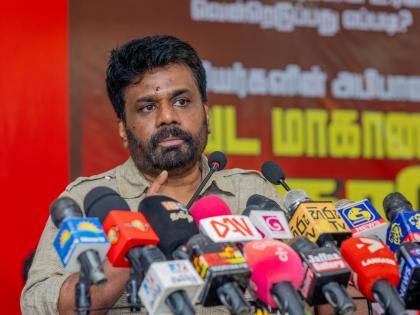Firebrand Marxist Leader Anura Kumara Dissanayake Declared Sri Lanka's New President
By Lokmat English Desk | Updated: September 22, 2024 20:32 IST2024-09-22T20:31:55+5:302024-09-22T20:32:03+5:30
Anura Kumara Dissanayake, the leader of the self-proclaimed Marxist Janatha Vimukthi Peramuna (JVP), has been declared the next president ...

Firebrand Marxist Leader Anura Kumara Dissanayake Declared Sri Lanka's New President
Anura Kumara Dissanayake, the leader of the self-proclaimed Marxist Janatha Vimukthi Peramuna (JVP), has been declared the next president of Sri Lanka. The left-wing candidate swept polls across the south of the island this weekend, after a close contest which came down to preferential voting for the first time in Sri Lanka's history. The Tamil homeland saw another traditionally low voter turnout, with Dissanayake having a poor showing across the North-East. Districts in the Tamil homeland instead had preferential votes for his rival Sajith Premadasa.
Dissanayake was born into a lower-middle-class family in Thambuttegama village in Anuradhapura district, around 170 km away from the country's capital Colombo. Despite his father being a daily wager and his mother a homemaker, they managed to educate their son, who graduated with a science degree from the University of Kelaniya.
Dissanayake's active participation in student politics on the campus led him to join the JVP's anti-government armed uprising between 1987 and 89 against the "imperialist and capitalist" regime of then Presidents Jayawardene and R Premadasa. The Marxist leader rose to the position of national organiser of the Socialist Students Association in 1995 and was later appointed to the JVP's central working committee. In 1998, he became a member of JVP's political bureau.
In 2000, Dissanayake became a member of Parliament by contesting the Presidential elections through the nationalist list. While JVP supported President Kumaratunga's administration, his party later aligned with Sinhala nationalists in 2002 to oppose peace negotiations with the Tamil rebel group LTTE, fighting an armed uprising against the Sinhala-dominated government in Colombo.
Open in app